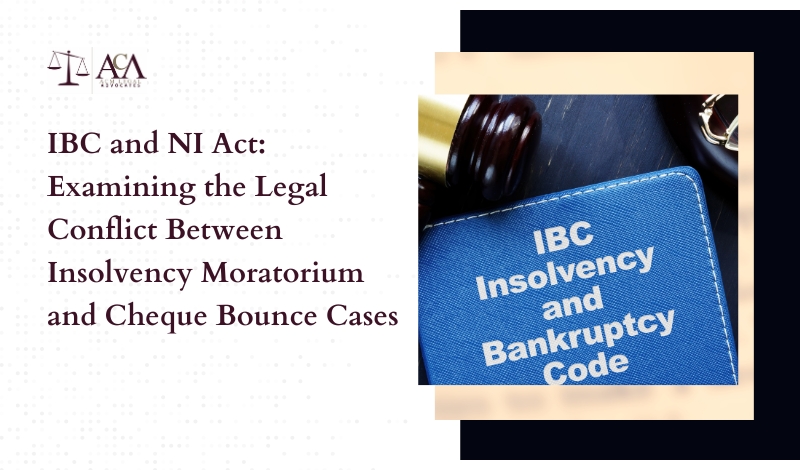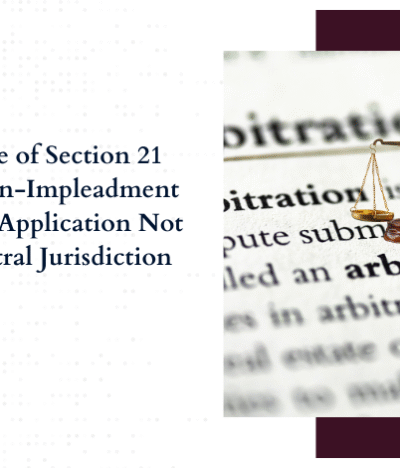Dissecting the Interface between IBC and Section 138 NI Act
The convergence of the Insolvency and Bankruptcy Code, 2016 (“IBC”) and the Negotiable Instruments Act, 1881 (“NI Act”) has given rise to intricate legal challenges, especially in the context of balancing creditor enforcement rights with the overarching goals of insolvency resolution. Section 138 of the NI Act penalises the dishonour of cheques due to insufficiency of funds, thereby upholding commercial morality and providing recourse to aggrieved creditors. It imposes criminal liability upon the drawer, acting as a statutory deterrent to default.
Conversely, the IBC, through Section 14, mandates a moratorium from the date of commencement of the Corporate Insolvency Resolution Process (“CIRP”), which suspends all legal proceedings against the corporate debtor. The objective of this provision, as elucidated by the Hon’ble Supreme Court of India, is to preserve the corporate debtor’s assets, provide a breathing space, and ensure a cohesive and non-fragmented resolution process.
This intersection—between the penal nature of cheque dishonour proceedings and the civil-commercial moratorium under the IBC—has raised substantial legal questions. Courts have been called upon to reconcile these competing statutory objectives, resulting in varying interpretations until the jurisprudence was partially settled by the Supreme Court in P. Mohanraj v. Shah Bros. Ispat (P) Ltd. [1]
Moratorium Under Section 14 IBC And Its Effect On NI Act Proceedings
While the IBC does not provide a definition of “moratorium,” its scope under Section 14 encompasses a broad prohibition against:
(i) institution or continuation of suits or proceedings against the corporate debtor,
(ii) transfer of its assets,
(iii) enforcement of security interest,
(iv) recovery of any property by an owner or lessor, and
(v) termination of supply of essential services to the corporate debtor.
The legislative intent is to prevent dissipation of the debtor’s assets and to prohibit multiple recovery actions by creditors during the pendency of CIRP, thereby maintaining order and efficiency in the insolvency process.
In contrast, Section 138 of the NI Act criminalises the issuance of a cheque without sufficient funds in the drawer’s account, a statutory offence rooted in public interest and commercial trust. The Hon’ble Supreme Court has, in various decisions, described Section 138 proceedings as “quasi-criminal” or “regulatory offences” with civil underpinnings. Notably, such offences are compoundable and primarily aimed at restitution.
The critical legal issue then is whether proceedings under Section 138—despite their penal form—should be suspended by the moratorium imposed under Section 14 of the IBC. This dilemma has been the subject of divided judicial opinion prior to the landmark Mohanraj judgment.
The Position Prior To Supreme Court’s Intervention In Mohanraj
Before the authoritative pronouncement in P. Mohanraj, High Courts adopted divergent views on the applicability of the moratorium to proceedings under the NI Act.
In Tayal Cotton Pvt. Ltd. v. State of Maharashtra [2], the Bombay High Court ruled that the expression “suits or proceedings” in Section 14 of the IBC does not extend to cheque bounce prosecutions under Section 138, citing their criminal nature. The Court relied on earlier decisions that had interpreted Section 14 narrowly in the context of the Companies Act.
Similarly, the Calcutta High Court in MBL Infrastructure Ltd. v. Manik Chand Somani [3] concluded that a declaration of moratorium under Section 14 did not bar the continuation of criminal proceedings under Sections 138 and 141 of the NI Act. These judgments did not adequately address the composite civil-criminal character of cheque dishonour cases, which ultimately led to confusion and forum shopping.
It was against this unsettled backdrop that the Supreme Court intervened in P. Mohanraj to provide clarity.
Supreme Court’s Verdict In P. Mohanraj And Its Aftermath
In P. Mohanraj v. Shah Bros. Ispat (P) Ltd., the Hon’ble Supreme Court undertook a comprehensive analysis of whether proceedings under Section 138 of the NI Act could be initiated or continued during the moratorium period imposed under Section 14 of the IBC. The Court unequivocally held that such proceedings fall within the ambit of the term “proceedings” as used in Section 14.
It was observed that cheque dishonour actions pertain to recovery of a debt and are initiated in courts of law; hence, they squarely fall within the scope of proceedings “against the corporate debtor” under Section 14(1)(a). Consequently, the moratorium operates to stay not just civil suits but also criminal proceedings under Section 138 insofar as they are initiated against the corporate debtor.
Importantly, the Court clarified that while proceedings against the corporate debtor are stayed, those against the natural persons—such as directors or authorised signatories—can continue unabated. This preserved the regulatory and deterrent nature of Section 138 while upholding the sanctity of the insolvency process.
The ruling overruled prior inconsistent judgments, including Tayal Cotton and MBL Infrastructure, and has since been followed in subsequent decisions.
In another significant judgment, Vishnoo Mittal v. Shakti Trading Company, the apex court examined a situation where dishonoured cheques were issued prior to the imposition of the moratorium, but the demand notice under Section 138 was served only afterwards. The Court held that the cause of action under Section 138 arises only after service of the demand notice and failure to make payment within the statutory period. Since the signatory ceased to have control over the company upon commencement of CIRP and appointment of the Interim Resolution Professional under Section 17 of the IBC, the director could not be held liable.
Individual Insolvency And Section 138: Emerging Conflicts Under Section 96 IBC
The ambit of moratorium under Section 96 of the IBC—pertaining to individual insolvency—has recently been subjected to judicial scrutiny. Two conflicting High Court judgments highlight the lack of clarity on whether the interim moratorium applicable to individuals under personal insolvency proceedings can stay proceedings under Section 138 of the NI Act.
In Sandeep Gupta v. Shri Ram Steel Traders & Anr. [4], the Delhi High Court considered whether the interim moratorium triggered by an application under Section 94 IBC (filed by the debtor himself) would bar cheque dishonour proceedings. The petitioner, a Managing Director who had issued the cheque on behalf of a company, argued that since he had filed for personal insolvency and was facing mounting liabilities as a guarantor, the interim moratorium under Section 96 should shield him from prosecution.
The Court, however, held that the interim moratorium under Section 96 does not extend to cheque dishonour proceedings initiated against individuals in their capacity as signatories or company officers under Section 141 NI Act. Since the debt in question was not a personal debt of the petitioner but rather of the company, the moratorium did not apply. Thus, the Court permitted the continuation of criminal prosecution under Section 138 of the NI Act.
Contrast this with the judgment of the Madhya Pradesh High Court in Surendra Kumar Patwa v. Dharmendra Vohra [5], where the insolvency process was triggered not by the debtor himself, but by a creditor under Section 95 IBC. In this context, the Court ruled that the interim moratorium under Section 96 would apply, staying all legal proceedings including those under Section 138. This ruling relied heavily on the language of Section 96 and applied the rationale of Mohanraj to individual insolvency.
The conflicting decisions—Sandeep Gupta and Surendra Kumar Patwa—have now reached the Supreme Court. In Rakesh Bhanot v. M/S. Gurudas Agro Pvt. Ltd., SLP (Crl.) No. 6087/2023 (judgment reserved on December 17, 2024), the apex court is poised to settle the ambiguity. The outcome will determine whether interim moratorium under Part III of the IBC can shield individuals from criminal liability under the NI Act.
Conclusion
The interface between insolvency law and criminal liability for cheque dishonour continues to be a legally intricate terrain. While P. Mohanraj offered definitive guidance by shielding the corporate debtor under a moratorium while preserving the liability of directors and signatories, uncertainties endure—especially in cases involving personal insolvency under Part III of the IBC.
The Supreme Court’s forthcoming judgment on the applicability of Section 96 IBC to Section 138 proceedings will likely become the cornerstone for resolving this evolving conflict. A harmonised legal approach is essential to balance the rehabilitative aim of insolvency law with the deterrent effect of penal provisions under the NI Act, ensuring that commercial discipline is preserved without derailing insolvency resolution processes.
[1] (2021) 6 SCC 258
[2] 2018 SCC OnLine Bom 2069
[3] 2019 SCC OnLine Cal 9097
[4] Sandeep Gupta v. Shri Ram Steel Traders, 2023 SCC OnLine Del 2786
[5] MANU/MP/3889/2024






